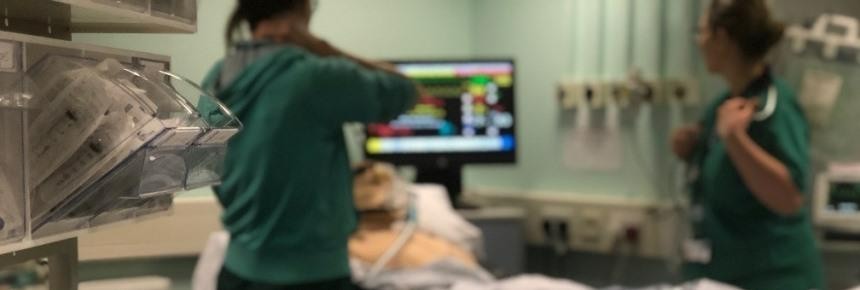The Portsmouth Hospitals University NHS Trust Simulation Centre, developed and set up by Professor Gary Smith, was officially opened by Secretary of State John Reid on 5th December 2003. The focus of the Simulation Centre is the training of healthcare professionals as individuals (for specific techniques) or as members of multi-professional teams. Simulation training is provided to train the staff and enhance patient centred care. The Simulation Centre runs various courses for staff ranging from trainee doctors and nurses, anaesthetists, surgeons, physicians, paediatricians, health care support workers, nursing associate/ associate nurse practitioners, operating department personnel, occupational therapists and physiotherapists.
Internal Courses
- ACRM - Anaesthetic Crisis Resource Management
- Advanced Practitioner Programmes
- Critical Care Induction & Nuts and BoltsDe-escalation
- Emergency Department Programmes
- Final Year Medical Students
- Foundation Year One Doctors
- Health Care Support Workers / Nursing Associates and Associate Nurse Practitioners
- International Transition and Overseas Programmes
- Management of the Deteriorating Patient Programmes
- MDT Theatres
- Mental Capacity Act & Deprivation of Liberty (MCA&DOLs)Paediatric Programmes
- Physiotherapy Simulation
- Preceptorship Programmes
- Renal
- Stroke
External Courses
- Basic clinical examination skills
- Identification and management of the deteriorating and critically ill patient
- Management of acute medical emergencies
- Management of obstetric emergencies
- Management of anaesthetic emergencies
- Non technical skills and human factors
The sophisticated human patient simulator consists of a whole body manikin driven by mechanical and computer software. Modelling of the cardiovascular, respiratory and metabolic systems of humans, together with fluid status, acid-base, temperature and pharmacodynamic effects of numerous drugs permits realistic scenario portrayal and role-playing.
Fully interactive and life-like manikin simulates clinical and anatomical parameters:
- Heart rate, rhythm and heart sounds
- Blood pressure (non-invasive and arterial)Respiratory rate and sounds
- Oxygenation/Saturation levels
- Temperature
- Bowel Sounds
- Anaesthetic gas parameters
- End Tidal carbon Dioxide levels
- Airway swelling and difficult intubation parameters
- Clinical Skills capability such as catheterisation, naso-gastric tube insertion and cannulation
-
To explore technical and non-technical skills e.g. communication and team working, around a specific scenario within the clinical environment
-
To explore and reinforce problem solving of individuals and teams within the clinical setting
-
The opportunity to explore hazards, deficiencies in clinical systems and latent errors within the clinical environment
-
To embed safety learning themes through simulated learning within the actual clinical setting
In-situ Simulation in Theatres Recovery

Use of Live Actor during in-situ simulation

Meet Dr Victoria Cathie!
What do you do:When I'm not working with the simulation team I'm based on the acute stroke ward. I've been working at PHU for the past 4 years and this is my second year as a simulation fellow - it went so well last year they couldn't keep me away!I've been working with the Older Persons wards to deliver in-situ simulation to the MDT covering topics such as deteriorating patients, falls, hypoglycaemia, stroke and communication skills. I've also developed an on-call bleep simulation experience for medical students.
This year I'll complete my teaching diploma, I'll be continuing to add to our in-situ projects within MOP and we are currently developing communication simulation around end of life care - it's exciting, it's going to be a busy year.
What would you like to do after your fellowship:
In-situ simulation is growing rapidly and becoming so well respected on the wards I'm excited to see how far we can embed the training to the natural ward life. I hope to achieve a streamline handover of the project reins at the end of the year and facilitate future learning.
I have no intention of hanging up my simulation hat and hope to continue working with simulation training throughout my future career.
Simulation faculty - support and opportunities
I've been lucky enough to be welcomed into the simulation team and given just the right amount of support and independence to feel in control of my own simulation projects. I've benefited from the professional knowledge and experience of my colleagues as well as having their encouragement working towards conference submissions and teaching progression. I hadn't expected that within the first year I'd be faculty on formal simulation courses or attending international simulation conferences to represent PHU.
I couldn't advocate a fellowship in simulation enough, particularly to anyone with a teaching or education interest. The simulation team at PHU really do stand out. Their reputation and ongoing work is well respected within the simulation community and their drive to deliver top quality teaching is evident in every course.

Dr Ben Atkinson, Clinical Director, Simulation Centre.Email: ben.
Lisa Toft, Resuscitation and Simulation Manager.Email: lisa.
Emma Williams, Senior Clinical Educator in Simulation Email: emma.
Raquel Gonzalez, Simulation Educator in Simulation Email: raquel.
Peter McCulloch, Simlation Technician in Simulation
Email: p.
Angelou De La Fuente, Simulation Administrator
Email: angelou.
